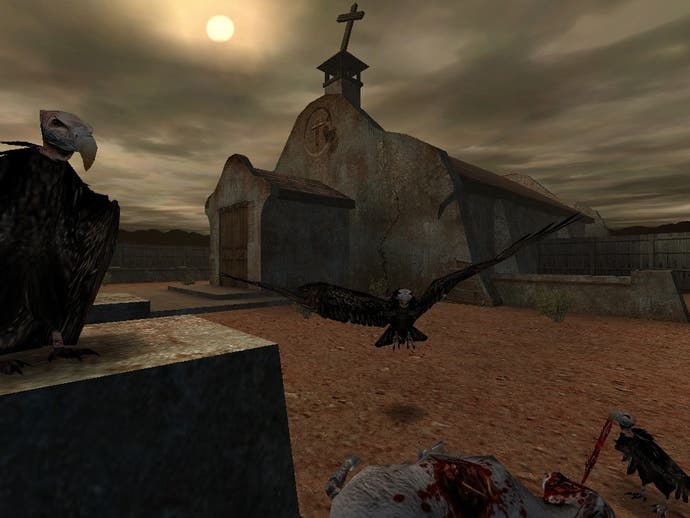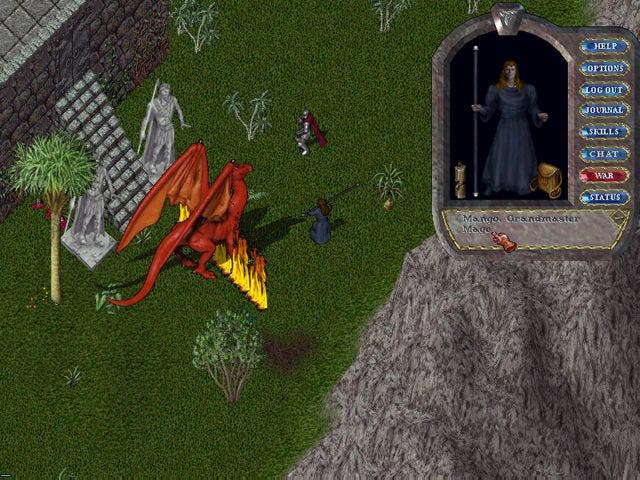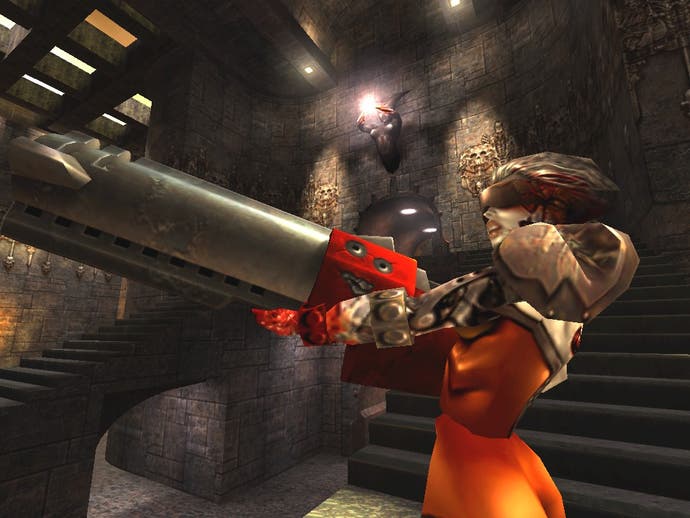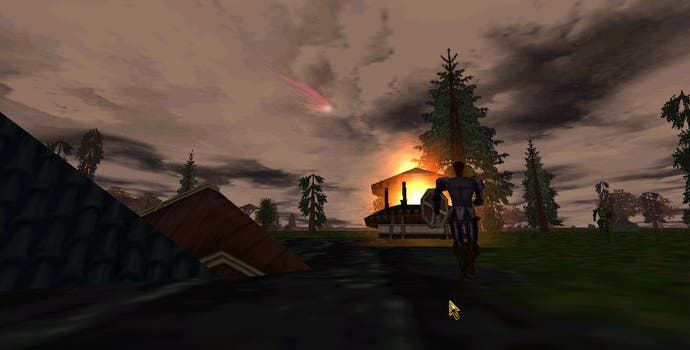Future Of Gaming
EuroGamer takes a look in the crystal ball
Over the last twenty years or so, computer games have gone from Pacman and Space Invaders to Quake III Arena and Battlezone II.
The internet has gone from something that only academics and the military used to a global network accessed daily by millions of users, and home to massive multiplayer games and online tournaments with thousands of participants.
Such rapid changes make it difficult to predict where the computer gaming industry is going five years from now, let alone fifty or a hundred. But that hasn't stopped the EuroGamer staff from taking a look at what the future of gaming may have in store for us all...

Rise Of The Uber-Publishers
The computer gaming industry is now big business, rapidly catching up with the kind of revenues previously reserved for the movie and music industries. And as it expands, our resident gaming evangelist, Mat Bettinson, predicts stormy weather ahead...
"It's going to get chaotic, like the music industry. There are going to be a lot of people making quality games, but then there's going to be unprecedented money ploughed into third-rate license tat as the industry cash turnover exceeds Hollywood."
He also points out that "we've seen some disturbing and rapid consolidation of publishers" recently, for example the sudden rise of Infogrames, who have taken over rival publishers GT Interactive, Accolade and Gremlin in the last couple of years.
And as ever, Electronic Arts remain a gargantuan influence on the gaming industry, with annual turnover now in excess of $1 billion!
In the short term, it looks as if consolidation, take-overs, and mergers will continue, with the gaming industry rapidly coming under the influence of a handful of big name publishers. This is especially true as advances in technology allow for more detailed locations and characters, resulting in a need for longer development cycles and bigger teams.
When you need dozens of artists and programmers to create a cutting edge title, and it takes two or three years to go from the design board to the shop shelf, you really need the backing of a publisher or other investors who are able to cover the massive costs that implies.

A New Hope?
But the rise of the internet could bring the reign of the uber-publishers to a swift end. As online stores multiply and bandwidth expands exponentially, it is now possible for companies to sell their games online.
By cutting out the middlemen - publishers, distributors, and retailers - and selling the game direct to the public, developers can make a much greater profit per unit, or sell their games for a lower price than would otherwise be possible.
Although online sales aren't quite ready to replace traditional retail just yet, the time is rapidly coming, and many of the larger publishers are likely to be taken by surprise when it does happen...
"Suddenly the publishers' monopolies collapse - anyone can fund and create a game (just as they can a music recording), and you can put it out there on the Net to sell for folks to download."
Only time will tell if developers can break free of publishers, or whether they will want to for that matter. Smaller developers especially may well continue to depend on the big publishers to provide them with funding for development and advertising, increasingly becoming in-house studios rather than independent developers.
What is likely to happen though is that some of the richer developers, who can afford to fund their own development costs despite the increasing complexity of games, will choose to go back to the shareware model of distribution, releasing a free demo of their game and then charging players to download the rest.
Companies like Epic Games and 3D Realms may go this route, as they both have valuable franchises (Unreal and Duke Nukem respectively) to provide them with the necessary financial independence, and they both have a long history in shareware.
Whatever happens, the next few years are likely to be interesting...

Console Compatibility
The new generation of consoles - Dreamcast, Playstation 2 and Dolphin - are the first to be designed to be used online, and already the first multiplayer console games are beginning to appear.
Nick Loman, EuroGamer co-founder, looks forward to the day when console and PC players will be able to play together online.
Already Windows, Mac and Linux versions of games like Quake II are compatible online, allowing users on a wide range of platforms to join in the action and play together. Before long consoles will get in on the act as well, bringing millions more players to the multiplayer gaming community.
Within a couple of years you will be able to play games like Quake III Arena online with your Playstation II, taking on PC, Mac, and maybe even Dreamcast users, all on a server which is probably running Linux.
When this happens multiplayer gaming will truly have arrived. We might not quite be at the "six billion players" promised by Dreamcast adverts yet, but bringing console gamers into the fold will certainly cause a boom in online gaming.

Multiplayer Takes Over
Perhaps the most obvious prediction we can make then is that within the next few years multiplayer gaming will have almost entirely replaced traditional single player.
Games like Ultima Online, Everquest, Quake III Arena and Unreal Tournament have already shown that multiplayer focused and even multiplayer only titles can reach a wide audience and make an impressive profit for the developers and publishers behind them.
When Ultima Online became Origin's most profitable game ever, they made the decision to ditch single player entirely and instead produce only multiplayer games in future.
Given that Origin was best known for the Ultima and Wing Commander series, which had always been single player only in the past, this was something of a leap of faith. But if the current stampede of online games is anything to go by, it looks as if their faith in multiplayer gaming will be rewarded.
Nick Loman predicts that games like Ultima Online and Everquest will continue to boom, with more and more players becoming addicted and spending hours online every day.
In fact, Richard "Lord British" Garriot of Origin recently said in an interview that he was looking at ways of allowing players to earn real money from their online exploits in his games. When that happens players will be able to immerse themselves in the game entirely and live out their lives online, playing games for a living!

Pro-Gaming Becomes A Mainstream Sport
Another way to make money from playing games is through "professional gaming", or "eSports". Already massive tournaments like the PGL and CPL are allowing the top players to earn a living through prizes, sponsorship and promotional deals.
In a recent interview with the Washington Post, one of the first pro-gamers, Dennis "Thresh" Fong, was said to have been earning $100,000 a year at his peak!
Obviously not everybody is as successful as Thresh has been for the last few years, but as more and more tournaments offering bigger and bigger prizes spring up all around the world, the top gamers are soon going to be able to make a comfortable living from what has always been regarded as a hobby in the past.
"Pro-gaming at the moment is comparable to the BBS and internet scene ten years ago", according to our web designer, Jay Adair. "It's small but happening, and there's about to be an explosion as more people get involved, bringing greater exposure."
And when that happens, pro-gaming could rapidly become the spectator sport of the new millenium...
"I'm getting a bit tired convincing people that eSports are going to be huge in the future", Mat admitted. "In the same way that I got tired of going on about the Internet before it went berserk."
"So now I like to shock people with statements based on a more distant future, even more outlandish, such as television coverage for eSports outstripping physical sports in the next 20 years. They go, "Yeah right!", at which point I ask them for their E-mail address so I can drop them a line in 20 years for a gloat."
Sounds ridiculous? Maybe, but then if you had told Joe Bloggs on the street twenty years ago that by the end of the century he would be using e-mail instead of sending letters, and playing computer games with near photo-realistic graphics with people from around the world, he would have thought you were mad as well!

The OGA
Last year saw EuroGamer launch the Online Gamers Association, an independent body intended to represent online gamers and help promote gaming as a sport of the future.
"The OGA intends to work with the gamers, to pull all the contributors together to get things going without large corporations trying to take a bite out of our scene just for the money," according to Jay.
Within a month of launching the OGA already has almost a thousand members worldwide, and preperations are already underway for OGA-affiliated leagues and tournaments, both here in Europe and around the world.
Plans for the future including the promotion of pro-gaming as a spectator sport, bringing about Mat's dream of gaming tournaments receiving live television coverage just like "real" sports such as motor racing, soccer or baseball.
Within a decade pro-gaming will be accepted as a sport in the same way that golf or cricket is today.
The top players and teams will receive millions of dollars worth of sponsorship. Teams could find themselves paying lavish transfer fees to lure top talent away from rival clans. And millions of people around the world will watch the latest international tournaments online or on digital television services.
Of course, this doesn't mean that gaming will all become "serious", and the OGA is intended to represent casual and "amateur" gamers just as much as the hardcore professionals.
Just as you can kick a ball around a park with a few friends without needing to be in an official team or league, so the majority of gamers will no doubt continue to play computer games just for the fun of it.
But for those of you who want to play games for a living, and for the rest of us who would like to be able to watch an international Quake tournament on the TV instead of tennis or boxing, the possibilities are endless...

Multiplayer And Single Player Merge Into A Glorious Whole
Of course, this doesn't necessarily mean the end for single player though. Peter Male, our resident hardware specialist, expects a split between single player and multiplayer focused titles.
"There will be games that offer a deep story line but have no real scope for multiplayer interaction, and there will be massively multiplayer games where everyone plays a different character within the world."
But within the next few years these two extremes will be integrated into a new generation of massively multiplayer games with their own stories to tell and continuing plot lines, created randomly by the game in response to player actions, run by a team of human "dungeon masters", or probably a mixture of the two.
Asheron's Call is already showing the possibilities of this, with huge events taking place such as a sudden cold spell over Christmas that left the entire game world covered in snow, and the world coming to a violent end in a hail of fire at the end of the game's public beta test period.
The next generation of massively multiplayer games will take this to its logical extreme, giving you the same kind of Earth shattering events, heroic quests and character interaction you would expect from a good single player role-playing or adventure game, but all in a real time online 3D world which will be home to thousands of players from around the world.

Eye Candy Explosion
And with the latest 3D technology bringing us ever closer to rendering in real time the kind of detail usually only seen in computer generated special effects shots in big budget movies, games should look better than ever as well.
"With technology like geometry processing, texture compression, hardware raytracers etc, things can only get more realistic", according to Pete. "The potential for a Johnny Mnemonic style future is there."
The distinction between gaming and reality is becoming more and more blurred, with graphics rapidly approaching photo-realistic levels, and massively multiplayer worlds that are home to thousands of real people from around the world becoming common place.
Soon we may be unable to tell the difference between the real world and the fantasy worlds we play in. "One would hope that we don't end up entrapping ourselves in a Matrix-style virtual world with apocalyptic consequences!" joked Nick.
But with online games like Everquest (nicknamed "Evercrack" because of its addictive qualities) already sucking players in for hours at a time, who knows?
Within a few decades we may be able to lose ourselves in a virtual world that is home to millions of gamers around the world. We will be able to see, hear, and maybe even feel it, and it will seem as real as the real world. We will be able to make a living by playing games, all without ever leaving the computer.
It has already begun - the first truly successful multiplayer RPG, Ultima Online, has seen players getting married, selling "virtual real estate" and items that have no existence outside of their computer for real cash, and holding demonstrations and rallies, all within the game.
Is it such a stretch of the imagination to think that as the games and their graphics become more and more immersive that many players may find themselves living within the game?
John "Gestalt" Bye
-

